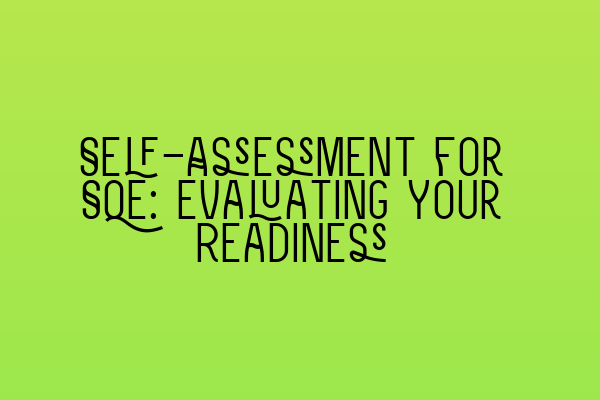As an aspiring solicitor preparing for the Solicitors Qualifying Exam (SQE), it is essential to evaluate your readiness through self-assessment. By undertaking this evaluation, you can identify your strengths, weaknesses, and areas for improvement, ultimately increasing your chances of success. In this blog post, we will explore the importance of self-assessment for SQE and provide valuable insights to help you undertake this process effectively.
Why Self-Assessment Matters for SQE
Self-assessment is a crucial step in your SQE preparation journey. It allows you to gain a comprehensive understanding of your current knowledge and skills level, enabling you to tailor your study plan accordingly. By identifying your strengths, you can focus on reinforcing them, while pinpointing your weaknesses will help you prioritize areas that require additional attention.
Furthermore, self-assessment allows you to gauge your overall preparedness for the SQE and make informed decisions about the extent of further study or revision required. It helps you set realistic goals and benchmarks, ensuring that your study plan is efficient and effective. Ultimately, self-assessment empowers you to take control of your learning and maximize your chances of success.
Steps for Self-Assessment
Evaluating your readiness for the SQE involves several key steps that will provide you with valuable insights. These steps are:
1. Review the SQE Syllabus
The first step in self-assessment is to familiarize yourself with the SQE syllabus. The syllabus outlines the knowledge, skills, and behaviors required to pass the exam. By carefully reviewing the syllabus, you can gain a clear understanding of the subject areas covered and assess your level of familiarity with each topic.
You can find the detailed SQE syllabus on the Solicitors Regulation Authority (SRA) website, ensuring that you have the most up-to-date information.
2. Identify Your Strengths and Weaknesses
Once you have reviewed the SQE syllabus, it’s time to assess your strengths and weaknesses. Start by listing the subject areas in which you feel confident and knowledgeable. These are your strengths. Give special attention to topics that align with your previous academic or professional experience, as they are likely to be areas of strength.
Next, identify the subject areas where you feel less confident or lack sufficient knowledge. These are your weaknesses. Be honest with yourself during this step, as acknowledging and addressing your weaknesses is essential for improvement.
3. Assess Your Study Materials and Resources
After identifying your strengths and weaknesses, evaluate the study materials and resources at your disposal. Determine if you have access to comprehensive textbooks, online courses, practice exams, or any other relevant materials. Having access to high-quality resources is vital for effective self-assessment and targeted study.
If you find any gaps in your study materials, consider investing in additional resources or seeking assistance from reputable SQE training providers. They can offer valuable guidance and materials to support your self-assessment process.
4. Set SMART Goals
Setting SMART (Specific, Measurable, Achievable, Relevant, Time-bound) goals is an effective way to structure your self-assessment process. Based on your strengths and weaknesses, establish specific targets for improvement. For example, you might set a goal to achieve a certain score on a practice exam or to master a specific topic within a given timeframe.
Remember, SMART goals help you track your progress, stay motivated, and ensure that your efforts are aligned with your ultimate objective of passing the SQE.
5. Create a Study Plan
With your self-assessment outcomes and SMART goals in mind, develop a comprehensive study plan tailored to your needs. Divide your study time to cover all subject areas adequately, dedicating more time to weaker areas while still reinforcing your strengths.
Ensure that your study plan includes regular practice exams and mock tests to assess your progress objectively. Evaluate your performance critically and adjust your study plan accordingly based on the areas that require further attention.
Conclusion
Self-assessment is an integral part of SQE preparation. By evaluating your readiness through this process, you can identify your strengths, weaknesses, and areas for improvement. This insight enables you to develop a targeted study plan, set achievable goals, and maximize your chances of success in the SQE.
Remember, self-assessment is an ongoing process. Continuously reassess your progress and adapt your study plan as needed. Stay motivated, seek support from SQE training providers when necessary, and utilize the valuable resources available to you.
For additional insights on related legal topics, we recommend reading the following articles:
- Tenant Rights in the UK: Understanding Your Legal Protections
- Examining the Intricacies of Land Law in the UK
- Legal Considerations in Residential Leases: Essential Insights for Solicitors
- Workshops on Land Law: Interactive Learning for Aspiring Property Law Professionals
- Lease Laws in the UK: Unraveling the Legal Framework for Tenants

Leave a Reply